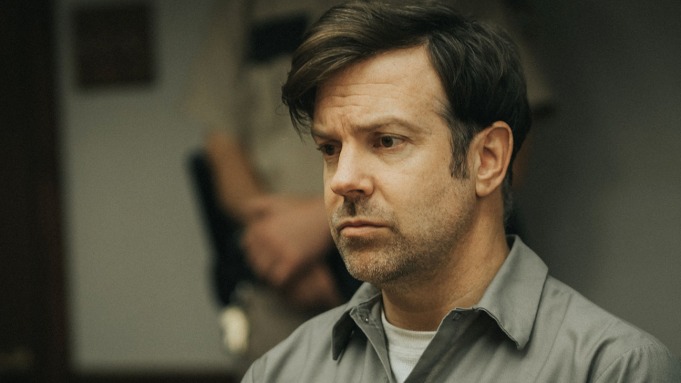Film Review: “South of Heaven”
Ted Lasso goes John Wick in this baroque crime thriller from ‘Big Bad Wolves’ director Aharon Keshales.
by Frank Scheck
Jason Sudeikis has been cast in dramatic roles before, but nothing quite like the latest feature from Aharon Keshales, director of the 2013 Israeli cult horror classic Big Bad Wolves. Playing a recently released ex-con who becomes embroiled in a dangerous game of cat-and-mouse with a big-time gangster, the Ted Lasso star displays his macho bona fides while delivering a performance of nuance and depth. Unfortunately, his sterling efforts are not enough to overcome the overly convoluted plot machinations of South of Heaven.
The filmmaker credits Don Siegel’s great ’70s crime drama Charley Varrick as an inspiration for this effort, and it’s easy to see the similarities. That film featured Walter Matthau in an atypical role as a resourceful criminal who uses his wits to outfox his dangerous adversaries. Sudeikis essays a similar character in Jimmy Ray, who’s released a few years early from a 15-year sentence for bank robbery after he makes an impassioned plea to be allowed to reunite with his longtime girlfriend, Annie (Evangeline Lilly), who has cancer and less than a year to live. “I’m gonna give Annie the best year of her life,” he assures the parole board.
For a short while, it looks like the film will be a love story between a man desperately trying to pick up the pieces of his life and the woman who faithfully waited for him for 12 years. But much like Dustin Hoffman in 1978’s Straight Time, Jimmy soon runs into trouble in the form of his malevolent parole officer, Schmidt (Shea Whigham, delivering yet another terrific supporting turn). At first, Schmidt simply utters vague threats. But things turn darker when he blackmails Jimmy into performing a criminal act for him.
That’s but the first plot twist befalling Jimmy, who seems to suffer from inordinately bad luck. Distracted while driving one night, he accidentally kills a motorcyclist, and begs his friend (Jeremy Bobb), a reformed criminal himself, to help him destroy the evidence at his salvage shop. The job gets done, but what Jimmy doesn’t realize is that the victim was a courier for a local crime boss, Whit Price (Mike Colter), and that he was carrying $500,000. Demanding his money back, Price soon enters the scene, setting off a violent chain of events including torture, murder, and not one but two kidnappings.
Keshales has the self-assurance to take his time, not rushing the pacing and including many character-defining moments, as when Jimmy and Annie nervously prepare for their first night together, each insecure about their appearance. One of the film’s highlights is a quiet conversation between Price — the sort of brutally violent but soft-spoken criminal who describes himself as “a businessman who’s involved in several … ventures” — and Annie, in which they share their respective stories involving cancer. The director also allows for some interesting, if jarring, tonal shifts — when Jimmy kidnaps Price’s bratty young son (Thaddeus J. Mixson), the film threatens to become a John Hughes-style black comedy.
But the screenplay — co-written by Keshales with Kai Mark and Navot Papushado — ultimately piles on too much, resulting in a severe lack of credibility. And while Sudeikis proves highly effective as a criminal with a heart of gold, he’s less convincing when forced to go into full John Wick mode in an impressively choreographed climactic shootout seemingly shot in a single take.
South of Heaven is the type of film that’s good enough to make you wish it were better, its problematic whole being less than the sum of its admirable parts.


Comments are closed, but trackbacks and pingbacks are open.